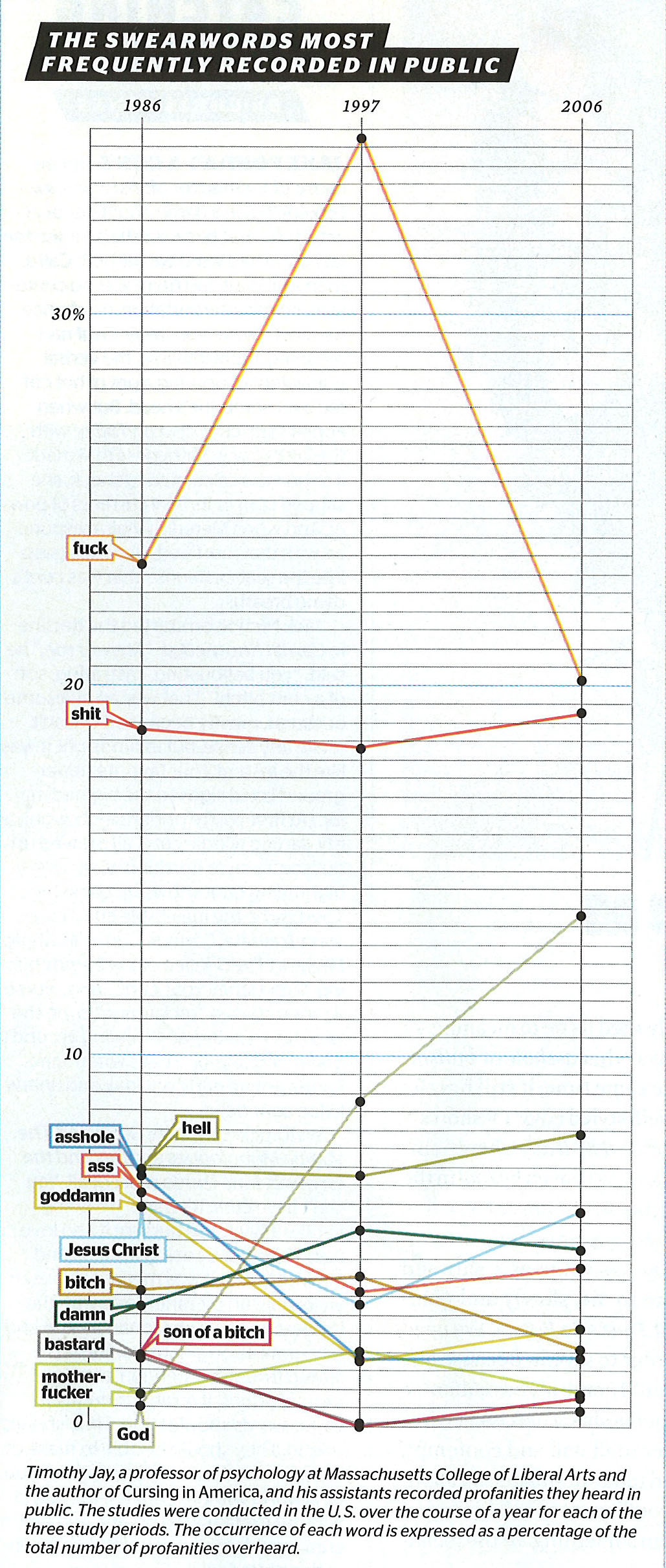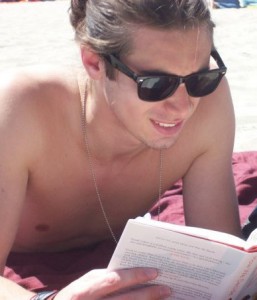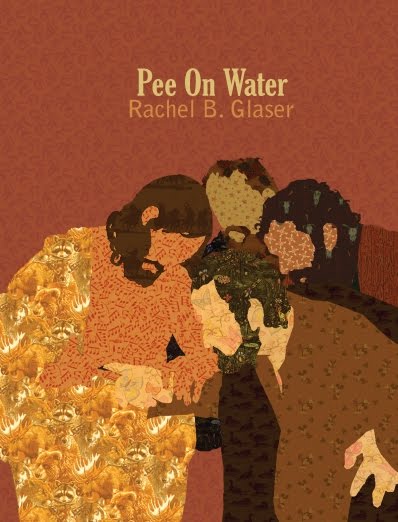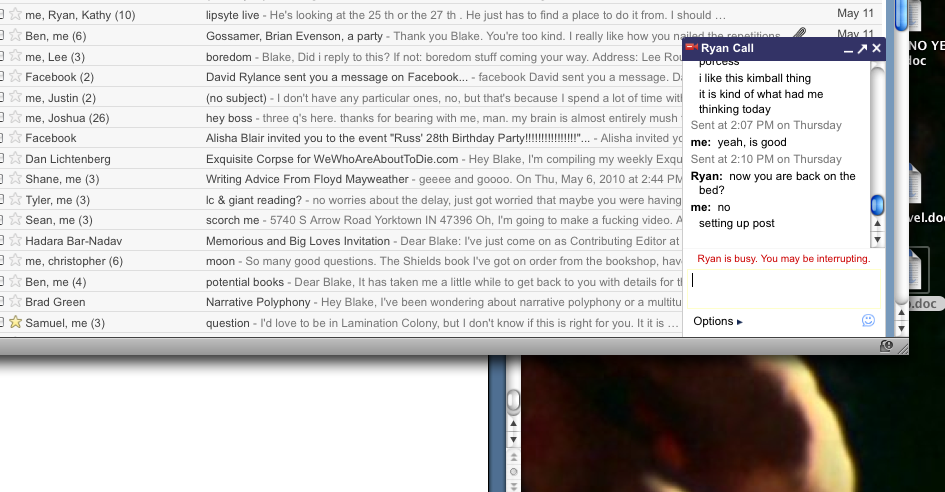Monte Hellman, the brilliant director of Two-Lane Blacktop, has made a new movie. He says: “While I love making things as realistic as possible, I’m interested in stories that are a little more surreal. I’ve always been drawn to, say, what Alain Resnais did in ‘Last Year at Marienbad,’ where there’s a kind of puzzle going on. I love to play with the idea of complex reality and mixing memory with present time and the whole idea of reality versus fantasy. So this is a dream project for me.” If you haven’t seen Monte’s movies, do. And in the book world: Richard Nash, ex-kingpin of Soft Skull and current seer, gives some details on his new startup publishing community, Cursor. Read up on how he’s going to bust things up & build them better.
Where the Words Come From: A Gmail Fuckoff about Getting Work Done
Ryan: wat else you doing rightnow?
like this instant what ar eyou doing!
i am always curious what you doSent at 1:45 PM on Thursdayme: hahai was laying on the bedthen i got back up and saw your msgi got up cuz i thought of a sentence for this collab thing i am trying to finish a draft ofRyan: hahai seeyou just think sentences?i dont think sentencesi dunnoi cantmy braini dunnome: well i have a set of images the thing is ending withand i had a sentence that resolves one of them occuryeah i think entirely in sentences mostlybut often based out of an initial image or situation of imagesso the sentence kind of falls out of the image in specific wordsbut i dont really think about the wordsor the image
Michael Kimball Guest Lecture Series (6): Acoustics
I hate this quote from Janet Burroway: “Novelists and short-story writers are not under the same obligation as poets to reinforce sense with sound.” I don’t think she understands what Andy Devine does: “Words have acoustical qualities that resonate with being human.”
Fiction begins with language, which is an acoustical occasion. The fiction writer who writes with acoustics uses a kind of close attention. It’s looking hard at the sentence until it opens up. It’s feeling around between words until you find spaces that require new words, new beats. It’s beyond semantics (though it still depends on sense). It’s recognizing the recurring sounds and using them to rewrite a sentence. Maybe the first word in the sentence has a long-o sound in it and the sentence will feel finished if it ends with another word with another long-o sound in it, say, smoke. Maybe the fact that that sentence ends with a hard-k leads to the next sentence beginning with another hard-k sound, so the consonants run together and there isn’t any space between the sentences, not even really a pause, and then all of a sudden the narrative speeds up in a way that feels thrilling and there’s a fire and that story never would have happened if the fiction writer weren’t working with the acoustics. Working with acoustics, it’s a different way to find the right word, or the right place for the right word. It’s a different way to write or revise a sentence or a group of sentences. I like the compositional nature of it.

Dawn Raffel
The fiction can sound however you want it to sound, but it’s figuring out what those things are for you, or for the piece you’re working on, and then using those sounds to make something happen in the fiction, even if it’s something that the reader only feels and doesn’t quite know why. I know writers who are partial to glottal stops and other percussive consonants. I know writers who like the liquid consonants and sibilance. And I know one very particular writer who tries to remove all of these acoustical relations, so that no single sentence is repeating any particular sound. I used to focus on assonantial relations within sentences, but now I’m more often looking for them from one sentence to another sentence, a way to get from one sentence to another sentence.
Curse Speech

From Esquire, July 2008 via Clusterflock
second-hand 7 sawing angels
3. Helen DeWitt on Sam Lipsyte. Great links within (including: I read Sam Lipsyte’s Home Land during one long, heroic bowel movement.)
I am often told by people who meet me after reading my books that they are afraid of me.
7. riverbabble wants your work.
2. Have your character do anything but cry. Thanks.
May 13th, 2010 / 8:48 am
HTMLGIANT: Mancandy Represent!

Tentacle-rape anime is so 2000 and late. What’s 3008? Hot Guys Reading Books.
This site posts pictures of men reading.
HTMenL of Summer! Grab some Crisco, lose the shirt and submit!
Friends, I am editing the upcoming month of Everyday Genius. The upcoming month is June. It’s going to be so hot, then. What the hell are we going to do? Anyway, please email me any submissions that you are submitting–gifts, I want gifts!–to my email, whatever that is. It’s alecniedenthal@gmail.com. Please email me viruses and sign me up for newsletters, too. All is a mess.
PREMIERING AT CANNES: RUBBER
httpv://www.youtube.com/watch?v=yyBAnZdIvf4
Quentin Dupieux, the director: I’m still naïve enough to believe that there is still room for unconscious and format-free films claims Dupieux. The too formatted films, structured as emotional machines, annoy me. I like the idea of doing a film on a living tire, with no narrative structure nor dramatic stakes. It’s possible! Also, The budget was very limited : I conceived the script, taking into account our means, and I like working like that a lot. Thus, RUBBER is the story of a serial killer tire that refers to his youth: Around the age of 12, my father’s video camera made me feel like filming. Then I discovered horror movies in video clubs and I instinctively needed to remake some fragments at home. And why a tire? I can’t answer questions starting by why. The introductive monologue of my film includes exactly 8 why. Life is full of mysteries… Why don’t we see the air around us? Why a tire? This is the same question.
Want to see.



